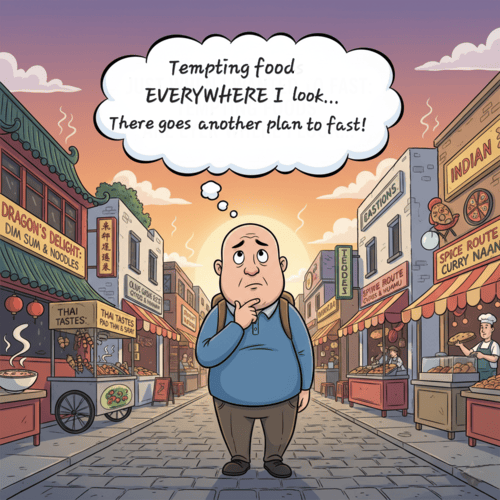Why Christians Fast: The Biblical Discipline’s Very Real Rewards
Why would Christians, who rejoice in the good gifts of food and fellowship, deliberately choose to go without? Isn’t fasting just an Old Testament ritual—or perhaps a leftover of medieval superstition?
Surprisingly, the Bible never cites fasting as a direct command. “Thou shalt fast” isn’t chiselled in stone alongside the Ten Commandments. Yet Scripture repeatedly commends fasting, and Christ Himself modelled it for us. What’s more, Jesus assumes His followers will fast too. In Matthew 6:16, He doesn’t say if you fast, but “when you fast.” And He promises something remarkable: your Father “who sees in secret will reward you” (Matt. 6:18). Real discipline. Real rewards.
From a Reformed perspective, fasting isn’t a work we do to earn salvation or divine approval. Neither is it a ploy to manipulate God into giving us what we want. Instead, fasting is the voluntary discipline of abstaining from food (and sometimes drink) to set aside concentrated time for prayer and the Word. When we fast, we acknowledge our total dependence on God rather than on His provisions. We’re declaring that man does not live by bread alone, but by every word that proceeds from the mouth of God.
Why Scripture—AND JESUS—Encourage Us to Fast
- First, fasting expresses our deepest longing for Christ’s return. When we push away from the table, we’re saying, “Come soon, Lord Jesus. There’s nothing in this life I’d rather have but You.” Every voluntary hunger pang becomes a prayer: “Your kingdom come.” We demonstrate even legitimate, good gifts like food pale in comparison to fellowship with the Giver. This is why Jesus said His disciples would fast when the Bridegroom was taken away (Matthew 9:15)—fasting embodies our groaning for our Bridegroom’s return.
- Second, fasting brings us to the end of ourselves and refines our prayers. Fasting and physical hunger have a remarkable way of revealing our inner poverty. When our stomachs growl, our self-sufficiency crumbles. We learn to pray, “May Your will be done,” not as empty words but as desperate dependence. Fasting doesn’t change God’s mind; it changes ours. Through this discipline, the Spirit refines what we ask for, teaching us to pray according to His will rather than our appetites.
- Third, fasting prepares us for victory in spiritual battles. After His disciples failed to cast out a demon, Jesus explained, “This kind cannot be driven out by anything but prayer and fasting” (Mark 9:29). Some victories require heightened spiritual focus that fasting provides. When we deny the flesh even its legitimate desires, we sharpen our spiritual senses and fortify ourselves against temptation. Christ Himself fasted forty days before confronting Satan in the wilderness—the pattern is clear.
How Are We to Fast?
In the Reformed tradition, fasting isn’t ever to be separated from its biblical purpose: a concentrated time for prayer and Scripture reading. This is crucial. Fasting without prayer is just dieting. Fasting without the Word is merely going hungry. The time we would normally spend preparing, eating, and cleaning up meals should be redirected toward communion with God through His Word and prayer.
Here’s where vigilance is essential: if we’re not careful, Satan will distract us from these biblical goals. He’ll tempt us to fill fasting hours with busyness, entertainment, or even “productive” activities that aren’t centred on God. The enemy knows prayer and Scripture are precisely what empower us spiritually, so he’ll work overtime to substitute anything else—even seemingly good things—for these means of grace. Let’s guard our fasting time jealously for its intended purpose.
Scripture presents several fasting patterns.
- Normal fasts: involve abstaining from food while drinking water (Jesus in Matthew 4:2).
- Partial fasts: we restrict ourselves to certain foods or meals, as Daniel did (Daniel 10:3).
- Absolute fasts: we exclude both food and water for short periods (Esther 4:16, Paul in Acts 9:9).
- Intermittent fasting: Some even practice skipping specific meals regularly for prayer.
How long should we fast? Fasts in Scripture vary from single meals to 40 days. Beginners would do well to start modestly—skipping one meal weekly for prayer. As the Spirit leads and our body adapts, we can extend the duration gradually.
Breaking a fast matters as much as keeping it. End gently with light foods—fruit, soup, or juices. Avoid heavy meals that shock our systems. Most importantly, we transition from fasting into thanksgiving, recognising God sustained us throughout.
Things to Be Mindful of When We Fast
Jesus warned against fasting for human applause: “When you fast, do not look gloomy like the hypocrites” (Matthew 6:16). If we’re not careful, even this discipline can become a source of pride.
We’re commanded to fast in secret—it’s between us and God alone. Let’s be mindful never to mention our fasting in conversations or use it for subtle one-upmanship. The praise earned from others is hollow; Jesus said those who fast for show “have received their reward in full” (Matthew 6:16). Better to hunger for God’s “well done” than human applause.
What Are the Benefits of Fasting?
The spiritual benefits are paramount. Fasting intensifies our prayer life, deepens Scripture meditation, and heightens our sensitivity to the Spirit’s voice. It mortifies fleshly desires and cultivates self-control. Regular fasting trains us to deny ourselves and take up our cross daily.
Practical benefits include mental clarity and renewed perspective on life’s priorities. When we fast and voluntarily embrace discomfort, we grow in compassion for those who hunger involuntarily. Fasting also exposes our emotional eating patterns and idolatrous relationships with food and other worldly pleasures.
Holistic benefits: The rewards of fasting are tangible, as promised by Scripture. Jesus assures divine recompense (Matthew 6:18), often manifesting as spiritual breakthroughs: sharpened prayer (Ezra 8:23), victory over temptation (Matthew 4:1-11), even fresh guidance (Acts 13:2). It deepens humility, reminding us we live by God’s Word, not bread (Deuteronomy 8:3).
Reformed experiences amplify this. Calvin reported fasting fostered repentance and controlled passions, preparing believers for godly living. Puritan Richard Baxter documented heightened clarity and revival during fasts amid persecution. His personal journals reveal deepened communion with God and communal unity. In the Westminster Assembly era, fast days led to national humility and perceived divine favour (2 Chronicles 7:14). Modern Reformed voices echo these: fasting mortifies sin (Colossians 3:5), aids decision-making, and ignites gospel joy, all under sovereign grace. It’s not magical but experiential—benefits flow from faith, transforming ordinary Christians into those who feast on God’s presence.
Common Misconceptions
Misconception #1: “Fasting is works-righteousness.” No. We fast from grace, not for grace. Our justification is settled—Christ’s righteousness is credited to us by faith alone. Fasting belongs to sanctification, not justification. It’s a response to grace, empowered by grace, and is sustained by grace.
Misconception #2: “Fasting is only for extreme circumstances—national disasters or personal crises.” Scripture shows regular, rhythmic fasting. Anna “worshiped with fasting and prayer night and day” (Luke 2:37). The early church fasted routinely (Acts 13-14). Jesus expected His disciples to fast regularly (Matthew 6:16). Yes, we must fast in crisis—but we also fast as a normal spiritual discipline.
Misconception #3: “Fasting is an obsolete Old Testament practice that Christians don’t need to follow.” Wrong. Jesus fasted. The apostles fasted. The early church fasted. There’s no New Testament abrogation of this discipline. If anything, Jesus intensified the expectation by addressing how to fast, not whether to fast.
Misconception #4: “The longer or harder our fasts are, the more spiritual they are.” God examines the heart, not the stopwatch (1 Samuel 16:7). A proud forty-day fast is worthless. A humble one-meal fast is precious. Let’s be mindful we don’t let fasting become a competition or a source of spiritual pride. The Pharisees tried that. Jesus condemned it. A meal skipped with sincere prayer outweighs a theatrical week-long fast done for show.
So Let’s Return to the Lord with Fasting
Fasting is a neglected but thoroughly biblical means of grace. It’s a discipline richly attested in the Christian tradition yet largely forgotten in contemporary practice. It’s not about earning God’s favour—Christ has done that for us once for all. It’s about expressing desperate dependence, mortifying the flesh, and seeking God’s face with undivided attention.
So may the Holy Spirit remind us to recover this discipline. Let’s not wait for perfect circumstances or an extraordinary crisis. Let’s start small: let’s skip one meal this week. And spend that time in prayer and Scripture. May we feel the hunger. May it remind us we were made for more than bread. We were made for God Himself.
The invitation stands: “’Yet even now,’ declares the LORD, ‘return to me with all your heart, with fasting, with weeping, and with mourning’” (Joel 2:12). And so does the promised reward: “Your Father who sees in secret will reward you” (Matthew 6:18).
WHY CHRISTIANS FAST: RELATED FAQs
What do contemporary Reformed scholars say about their personal fasting experiences? John Piper has written extensively about how regular fasting deepened his prayer life and broke the power of certain habitual sins in his life. DA Carson notes fasting helped him distinguish between genuine spiritual hunger and mere religious performance during his doctoral studies. Both emphasise that fasting revealed dependencies they didn’t know they had—not just on food, but on comfort, control, and predictability—driving them to greater reliance on God’s sufficiency.
- Should Christians fast during pregnancy, illness, or while taking medications? No—physical health and medical needs take precedence, as our bodies are temples of the Holy Spirit (1 Corinthians 6:19). Pregnant and nursing mothers, diabetics, those with eating disorder histories, and anyone on medications affected by food intake should not fast from food. However, they can practice other forms of fasting—from social media, entertainment, or other non-essential activities—redirecting that time to prayer and Scripture while honoring their body’s legitimate needs.
- Can fasting be done corporately, and what does Scripture say about this? Absolutely—Scripture frequently records corporate fasting for national repentance, seeking God’s direction, or spiritual warfare (Joel 2:15-16, Acts 13:2-3). Corporate fasts unite believers in focused prayer for shared concerns, creating powerful spiritual solidarity. Many Reformed churches practice quarterly corporate fasts, though these should be invitations rather than mandates, allowing individuals to participate according to conscience and physical capacity while the whole body seeks God together.
How does the Reformed view of fasting differ from Catholic and Eastern Orthodox perspectives, and why does the Reformed position align better with Scripture? Catholic and Orthodox traditions often prescribe mandatory fasting periods (Lent, Fridays, etc.) and view fasting as having meritorious value that contributes to one’s justification and the remission of temporal punishment for sin. The Reformed view rejects any notion that fasting earns merit before God or adds to Christ’s finished work—we’re justified by faith alone, not faith plus fasting. Scripture presents fasting as a voluntary spiritual discipline (Jesus said “when you fast,” not commanding specific times) that sanctifies believers already justified by grace, making the Reformed position more consistent with sola fide and the sufficiency of Christ’s atonement throughout Scripture.
- What’s the relationship between fasting and spiritual gifts or discernment? The early church fasted when seeking the Holy Spirit’s guidance for major decisions—choosing missionaries (Acts 13:2-3) and appointing elders (Acts 14:23). Fasting doesn’t manufacture the Spirit’s gifts, but it does quiet our flesh and sharpen our spiritual sensitivity to hear God’s voice through Scripture and providential leading. Reformed believers report fasting before major decisions helped them distinguish between their own desires and the Spirit’s direction, though we must remember that fasting provides clarity for discernment, not direct revelation beyond Scripture.
- How can families with young children incorporate fasting into their spiritual rhythms? Parents can practice modified fasts—skipping one meal while still preparing food for children—and use mealtimes to explain why they’re fasting and praying for specific needs. Older children (preteen and up) might join in skipping a single meal or fasting from screens/treats for a day, learning the discipline gradually. The key is making fasting a natural part of family spiritual life without imposing adult disciplines on young bodies still developing, while teaching children that we voluntarily sacrifice good things to pursue the best thing: intimacy with God.
How does fasting specifically help parents and those in ministry pray for those under their care? Reformed pastor and author Donald S Whitney notes fasting intensifies our intercession by adding physical urgency to our prayers—when we feel hunger pangs for our children or congregation, we’re reminded hourly to cry out to God for them. John Piper observes that fasting for his children’s salvation and sanctification helped him combat prayerless anxiety with active dependence on God’s sovereign grace. From a Reformed perspective, fasting acknowledges that we cannot change hearts—only God can regenerate and sanctify—so we fast to humble ourselves and plead for His intervention in the lives entrusted to us. Many pastors practice regular fasting for their elders, deacons, and members facing spiritual battles, recognising that shepherding requires not just wisdom and effort, but desperate, focused prayer for God to do what only He can do.
WHY CHRISTIANS FAST: OUR RELATED POSTS
- The Joy of the Lord: Pursued by Many, Possessed by Few
- Discipleship: What Does it Mean to Deny Ourselves and Take Up Our Cross Daily?
- How Timid Christians Stand Up to Intimidation: Courage Under Fire
- The Matthew 16:25 Paradox: What It Means to Lose Your Life to Find It
- ‘Sell Everything You Have…’: Are We To Do So Literally?
- ‘The Last Will be First’: How Christ’s Kingdom Economy Works
Editor's Pick

Did Joseph Sin in Marrying an Egyptian?
It’s a troubling question: if God forbade His people from foreign alliances, why was Joseph’s marriage to an Egyptian not [...]

Jacob’s Ladder: How Jesus Bridges Earth and Heaven
THE GOSPEL IN GENESIS 28... A stairway to heaven—humanity has always dreamt of one since the Fall. Every religion offers [...]

In the World But Not Of It: What John 17:14-16 Really Means
Scrolling through social media, we’re bombarded by voices shouting for our allegiance—politics, trends, ideologies. As Christians, we feel the tension: [...]

Is Molinism Biblical? Reformed Challenges to Middle Knowledge
In a world craving autonomy, does God truly reign supreme, or does He negotiate with human choices? The question lies [...]

Does the Bible Teach Purgatory? Scripture’s Clear Answer
Imagine standing at the very edge of eternity, wondering if the soul requires further cleansing before you enter heaven's gates. [...]

David Danced Before the Lord—Why Don’t Reformed Churches?
When we read about King David leaping and dancing before the Lord “with all his might” (2 Samuel 6:14), a [...]

Faithful to the Pattern: Why Paul Reserves Ordination for Men
Few topics in contemporary Christianity generate more tension than women’s ordination. This question touches real lives, genuine callings, and deeply [...]

‘Flee Sexual Sin’: Why Does Paul Single This Sin Out?
When the apostle Paul writes to the Corinthian church, he doesn’t tell them to simply avoid sexual immorality or resist [...]

Does Denying God’s Sovereignty Mean Denying the Gospel?
RC Sproul once warned denying God’s sovereignty “eviscerates” grace—a strong word meaning to gut or disembowel something, leaving only an [...]

Why Christians Fast: The Biblical Discipline’s Very Real Rewards
Why would Christians, who rejoice in the good gifts of food and fellowship, deliberately choose to go without? Isn’t fasting [...]
SUPPORT US:
Feel the Holy Spirit's gentle nudge to partner with us?
Donate Online:
Account Name: TRUTHS TO DIE FOR FOUNDATION
Account Number: 10243565459
Bank IFSC: IDFB0043391
Bank Name: IDFC FIRST BANK





